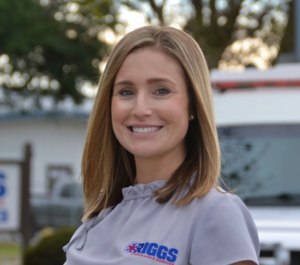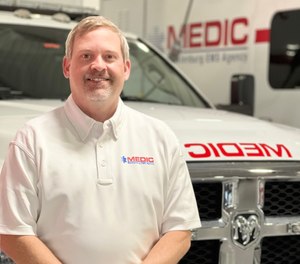Podcast | EMS One-Stop | Resuscitating EMS through trend analysis
43 min
Limited options for professional growth and the lack of a clear career path are barriers to recruitment, retention and career longevity.
The EMS Burnout Repair Kit series, presented by EMS1 and Zoll, equips individuals at all levels in EMS with tools for dealing with the primary sources of burnout, helping them emerge as better, happier providers and more complete people.
In this installment, a panel comprised of individuals representing different career paths in EMS and leaders from progressive agencies will discuss resources for career advancement and resiliency, how to find the path that is right for you, and how agencies can support providers in advancing their careers.
Join the live discussion, March 1 at 1 p.m. CT
Carly Alley

Carly Alley is the executive director for Riggs Ambulance Service in Merced, California. Earlier in her career, Alley served as a firefighter-EMT in the U.S. Forest Service while earning her paramedic certification. After being hired by Riggs, she transitioned to the agency’s tactical EMS program, where she spent 10 years as the team leader before moving into administration.
Michael Fraley, BS, BA, NRP
-1.png?w=300&format=jpg&quality=87&crop=28%2C0%2C300%2C265)
Michael Fraley has over 25 years of experience in EMS in a wide range of roles, including flight paramedic, EMS coordinator, service director and educator. Fraley began his career in EMS while earning a bachelor’s degree at Texas A&M University. He also earned a BA in business administration from Lakeland College.
When not working as a paramedic or the coordinator of a regional trauma advisory council, Michael serves as a public safety diver and SCUBA instructor in northern Wisconsin.
John (JP) Peterson, MS, MBA

JP Peterson is the newly appointed executive director at Mecklenburg EMS Agency (MEDIC) in Charlotte, North Carolina. He started his career as an EMT in Chicago in 2000 and most recently served as vice president of Florida operations for PatientCare EMS Solutions.
He is licensed as a paramedic in Florida and North Carolina, and holds National Board Certification as an occupational therapist. He has completed Six Sigma Yellow Belt certification and is a graduate of the American Ambulance Association, Ambulance Service Manager Course. JP received the Pinellas County Commissioner, John Morroni Award for first responders in 2013.
JP is a past president of the Florida Ambulance Association. He is a member of the North Carolina Association of EMS Administrators as well as the AAA Bylaws, Professional Standards and Ethics committees.
The 2021 EMS Trend Report, produced in collaboration with Fitch & Associates and the National EMS Management Association, and sponsored by Pulsara, continues our effort to identify how those in EMS perceive growth, change and the challenges impacting the sustainability and future of the industry.
Last year, we said that 2020 would be a “defining year” for EMS. Even at the time, soon after the emergence of the new coronavirus in the U.S., we didn’t realize how much that might be true. It certainly was a defining year for EMS, for healthcare and for the entire global community.
A year later, the long-term impacts of the pandemic on our profession remain uncertain. What we do know is how the pandemic highlighted the adaptability of EMS. The sixth annual EMS Trend Report dives into the impact COVID-19 had, and didn’t have, the changes we’re embracing and the change providers want to see, as we explore the opinions, concerns and hopes of your colleagues across EMS at this critical moment in history.
Download your copy to read:
EMS1 Interview of AAA President Shawn Baird by AAA Communications Chair Rob Lawrence
As we enter, hopefully, a happier new year, several of our national associations that have been at the forefront of collaborative advocacy efforts and the voices of the EMS profession have undergone planned changes in their leadership.
To welcome in 2021, I sat down, via Zoom, with Shawn Baird, incoming president of the American Ambulance Association and asked him about 2020 and his thoughts on the future of our industry. Shawn is the vice president for rural services with MetroWest Ambulance Family of Companies in Oregon. Shawn spent the last two years serving the AAA as president elect and has been at the center of AAA activity and advocacy.
From Rob Lawrence’s EMS One Stop Podcast at EMS1
The American Ambulance Association HR Consultant discusses options open to EMS managers to ensure providers are vaccinated
The word of the week is vaccine, but is it giving EMS leaders a headache already? Host Rob Lawrence discusses the issues with American Ambulance Association HR Consultant, Scott Moore. Rob and Scott discuss the options open to managers to ensure all are vaccinated, while acknowledging the hope that science and understanding will prevail. They also discuss the other major news item of the week, EMS funding and the lack of it as reduced incomes put the very viability of service delivery at risk.
Scott Moore is a Massachusetts licensed attorney and possesses certifications as both a Professional in Human Resources (PHR) and the Society for Human Resources Management Certified Professional (SHRM-CP). He is a member of the American Bar Association (ABA), the Massachusetts Bar Association (MBA), the Northeast Human Resource Association (NEHRA), and the Society for Human Resource Management (SHRM).
In addition, Scott is an active member of the American Ambulance Association and has been a site reviewer for the Commission for the Accreditation of Ambulance Services (CAAS) for many years.
Read Rob’s article, “The word of the week is vaccine,” and listen to the podcast below.
From EMS1 on July 14 by AAA Communications Chair Rob Lawrence
Fifty years ago, on July 15, 1970, then California Governor Ronald Reagan signed into law the Wedworth-Townsend Paramedic Act. The law created the conditions for the establishment of the first accredited paramedic training program in the United States.
The story of American paramedicine did not begin in California or even in the U.S., but in Belfast, Northern Ireland. The inspiration for this program came from World War II era British Royal Army Medical Corps (RAMC) Medical Officer, Professor Frank Pantridge, MD.
On May 29’s Inside EMS podcast, AAA Communications Chair Rob Lawrence spoke with hosts Chris Cebollero and Kelly Grayson about national EMS issues including reimbursement, ET3, and more.
I recently reported on how the leaders of a few of our national associations united to tell the story of EMS on the front lines and to draw attention to the shortfalls we are all encountering daily from PPE to funding. EMS providers of all denominations are also coming together at a state level to tell their story and appeal for assistance and funding to ensure the continuity of operations. On Apr. 15, 2020, the Professional Ambulance Association of Wisconsin, Wisconsin EMS Association, Professional Fire Fighters of Wisconsin, and Wisconsin State Fire Chiefs Association conducted an online press conference to discuss the mobile healthcare situation in Wisconsin.
AAA Communications Chair Rob Lawrence shared his insights about recent EMS and fire association joint advocacy efforts in EMS1. Don’t miss the full article!
Last week, the AAA were approached, via EMS1, by U.S. News, a national publication represented by journalist Gaby Galvin, asking about COVID-19 as it affects the front lines, rates of infection and quarantine, and generally life on the street. This opportunity provided the chance to bring together three national organizations who are all working hard to represent their members, lobby Congress and highlight the challenges at the tip of the spear.